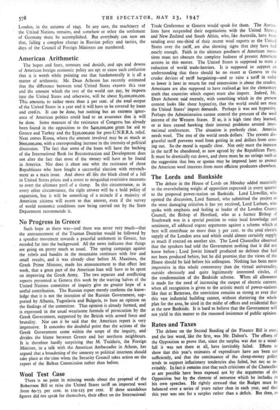No Progress in Greece
Such hope as there was—and there was never very much—that the announcement of the Truman Doctrine would be followed by a speedier movement towards a peaceful settlement in Greece, has receded far into the background. All the news indicates that things are going on pretty much as usual. The spring campaign against the rebels and bandits in the mountains continues with few and small results, and it was already clear before M. Maximos, the Greek Prime Minister, made his announcement to that effect last week, that a great part of the American loan will have to be spent on improving the Greek Army. The two separate and conflicting reports presented at Geneva this week by the warring halves of the United Nations committee of inquiry give no greater hope of a useful contribution. The Russian report merely confirms the know- ledge that it is not the intention of the Russian Government, sup- ported by Albania, Yugoslavia and Bulgaria, to base an opinion on the findings of the committee. That opinion is already formed, and is expressed in the usual wearisome formula of persecution by the Greek Government, supported by the British with armed force and brutality. Nor can it be said that the American report is very impressive. It concedes the doubtful point that the actions of the Greek Government come within the scope of the inquiry, and divides the blame between Greece and her northern neighbours. It is therefore hardly surprising that M. Tsaldaris, the Foreign Minister, in a talk with the American Ambassador in Athens, has argued that a broadening of the amnesty to political internees should take place at the-time when the Security Council takes action on the report of the Balkan Commission rather than before.


































 Previous page
Previous page